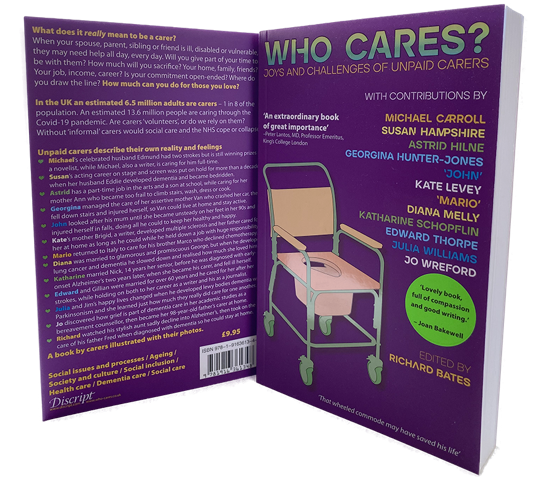Praise for the book Who Cares?
"In the great political row about Britain's collapsing care system, carers too often get forgotten. Yet, here they are, talking about the love that makes people care, in compelling stories to humanise the crisis."
Polly Toynbee, Guardian columnist, former BBC social affairs editor, co-author The Lost Decade
"‘Who cares?’ has become a huge question. Most unpaid carers are spouses or offspring, and Bates asked a dozen of them to write their stories. They are rivetingly candid. They tell tales of small tyrannies, bathroom horrors, mulish sulks and nocturnal needs, twice as demanding as child rearing. But also of the gratifying aftermath: guilt assuaged, duty fulfilled."
Valerie Grove, The Oldie
"Lovely book: full of compassion and good writing. Read Who Cares? to find out how people cope."
Joan Bakewell
"Thank you for sending me WHO CARES? Joys and Challenges of Unpaid Carers. I just read the account by Michael Carroll of caring for his husband Edmund White and it's so tender and unsparing and beautiful. Thank you for this collection."
Damian Barr, author of You Will Be Safe Here and Maggie and Me
"I congratulate you for bringing together an extraordinary book of great importance.
That the individual chapters are so different in every possible sense,
adds to the interest and it worked very well that you did not try to force
your contributors into a stylistic straitjacket."
Peter Lantos MD, Emeritus Professor, King's College London
"The time is long overdue for us to hear the story of the carers who live on the frontline;
the husbands, wives and children who perform the heroic task of making life tolerable
and even happy for those who need them most.
A dozen people who have been placed in this position have contributed to Who Cares?
Some (Susan Hampshire; Diana Melly) are household names. Others are not. What they share is an exceptional generosity of spirit, a humour and an enduring love which makes this book an inspiration, as well as an education to us all.
I hope it is as widely read as it deserves to be."
Miranda Seymour FRSL, biographer and novelist
"I cared for my partner Dan for the last year of his life. He moved into my house and established himself in my bed.
I was a bad carer. I felt sorry for myself having to look after a man who had always looked after me. He did all the cooking and driving, and now he was expecting me to do it! Bloody hell! I didn't want to.
The book Who Cares? is about how to care. Thank you for all the inspiration and generosity of spirit."
Nell Dunn,
Patron of Dignity in Dying and Playwright of Steaming, Poor Cow, Cancer Tales, and Home Death
"Excellent new book on the extremely challenging experiences of unpaid carers,
highlighting key socio-political issues affecting millions of families.
A range of moving personal accounts, including by Kate Levey
(on her mother Brigid, the renowned writer)."
Dr. Jaron Murphy, Senior Lecturer in Communication, Journalism and Literature at Bournemouth University
"I enjoyed your meaningful book.
The different perspectives are not only poignant, but helpful as well.
I gleaned something from all the different voices. . .
How the different authors saw themselves in the role of caregiver
is so varied, especially emotionally.
The anger, the distancing, the egos, the bewilderment all contributed
to helping me deal with how I feel."
Kani Flansburg, Sacramento, Calif.
"I have read just a couple of the accounts in your book and I am already very pleased that I have bought.
What an excellent publication on such a deeply important topic.
I shall be reading it slowly as each story is so moving and worthy of concentration and focus."
R H, psychotherapist, Manchester
